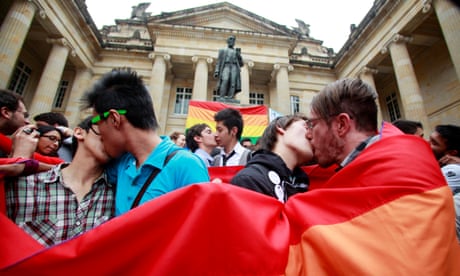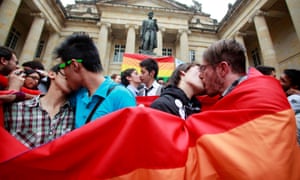http://www.theguardian.com/world/2016/apr/07/colombia-court-gay-marriage-ruling
Sibylla Brodzinsky in Bogotá
Friday 8 April 2016 00.07 BSTLast modified on Friday 8 April 201600.08 BST

Colombia: the next battleground in the global fight for marriage equality
Magistrate Alberto Rojas, who voted against the proposed ruling and will now write up the majority decision making gay marriage legal, said: “All human beings ... have the fundamental right to be married with no discrimination.”
A small group of marriage equality activists celebrated on the steps of the court, chanting: “Yes sir, I will get married because here inColombia the law now allows me to.”
The ruling means Colombia is set to become the fourth Latin American nation to fully allow same-sex marriage, after Argentina, Brazil and Uruguay. Mexico City and several Mexican states have also passed regulations allowing gay marriage and that country’s high court has ruled the unions had to be recognised nationwide.
A 2011 constitutional court ruling in Colombia recognised same-sex couples as families and ordered the congress to pass a law that would afford gay couples the same rights as heterosexual married couples. If lawmakers failed to pass a law by June 2013, by default gay couples could “formalise” their unions before notaries and judges.
But the court’s language was vague, and left many people in limbo. Many were told that they could not be married but they could enter into a “solemn contract”.
“We are super happy,” said Luís Felipe Rodríguez, a gay rights activist in Cali who challenged the court’s 2011 ruling. “This is a victory against all the conservative political parties, against the Catholic church and everyone who tried to block our rights.”
“This decision tells all those conservatives that equality is unstoppable,” he said, adding that he and his partner would spend the weekend making wedding plans.
Alejandro Ordóñez, Colombia’s ultra conservative inspector general, lamented the court’s decision, saying: “Today ... marriage is no longer marriage and family is no longer family.”
Rodríguez said the ruling came as something of a surprise because the court had postponed the debate on the issue of gay marriage eight times since August 2015.
Brian Silva, director of Marriage Equality, a US-based group, said the Colombian court decision was “great for the Colombian people but even greater for people around the world still fighting for marriage equality”.
The court had already ruled in 2015 that gay couples could adopt children but a senator, Viviane Morales, proposed a referendum that would allow Colombians to vote on whether or not the decision would become law.
In a survey conducted by a conservative university on Bogota found that 70% of Bogotá residents opposed gay couples’ right to adopt, while 57% disapproved of gay marriage.
Rodríguez expects similar challenges to the court’s ruling on marriage equality, although the court expressly stated that judges and notaries public cannot refuse to perform a same-sex wedding.
“We still have a tough battle ahead of us,” said Rodríguez.
Friday 8 April 2016 00.07 BSTLast modified on Friday 8 April 201600.08 BST
Colombia could become the fourth Latin American nation to fully allow same-sex marriage. Photograph: John Vizcaino/Reuters
Colombia’s highest court has given the green light to gay marriage in the conservative, mostly Catholic country.
The magistrates of the constitutional court voted six to three against a proposed ruling that said marriage applied only to unions between men and women and that it was up to the congress and not the court to decide on same-sex marriage.
Colombia’s highest court has given the green light to gay marriage in the conservative, mostly Catholic country.
The magistrates of the constitutional court voted six to three against a proposed ruling that said marriage applied only to unions between men and women and that it was up to the congress and not the court to decide on same-sex marriage.

Colombia: the next battleground in the global fight for marriage equality
Magistrate Alberto Rojas, who voted against the proposed ruling and will now write up the majority decision making gay marriage legal, said: “All human beings ... have the fundamental right to be married with no discrimination.”
A small group of marriage equality activists celebrated on the steps of the court, chanting: “Yes sir, I will get married because here inColombia the law now allows me to.”
The ruling means Colombia is set to become the fourth Latin American nation to fully allow same-sex marriage, after Argentina, Brazil and Uruguay. Mexico City and several Mexican states have also passed regulations allowing gay marriage and that country’s high court has ruled the unions had to be recognised nationwide.
A 2011 constitutional court ruling in Colombia recognised same-sex couples as families and ordered the congress to pass a law that would afford gay couples the same rights as heterosexual married couples. If lawmakers failed to pass a law by June 2013, by default gay couples could “formalise” their unions before notaries and judges.
But the court’s language was vague, and left many people in limbo. Many were told that they could not be married but they could enter into a “solemn contract”.
“We are super happy,” said Luís Felipe Rodríguez, a gay rights activist in Cali who challenged the court’s 2011 ruling. “This is a victory against all the conservative political parties, against the Catholic church and everyone who tried to block our rights.”
“This decision tells all those conservatives that equality is unstoppable,” he said, adding that he and his partner would spend the weekend making wedding plans.
Alejandro Ordóñez, Colombia’s ultra conservative inspector general, lamented the court’s decision, saying: “Today ... marriage is no longer marriage and family is no longer family.”
Rodríguez said the ruling came as something of a surprise because the court had postponed the debate on the issue of gay marriage eight times since August 2015.
Brian Silva, director of Marriage Equality, a US-based group, said the Colombian court decision was “great for the Colombian people but even greater for people around the world still fighting for marriage equality”.
The court had already ruled in 2015 that gay couples could adopt children but a senator, Viviane Morales, proposed a referendum that would allow Colombians to vote on whether or not the decision would become law.
In a survey conducted by a conservative university on Bogota found that 70% of Bogotá residents opposed gay couples’ right to adopt, while 57% disapproved of gay marriage.
Rodríguez expects similar challenges to the court’s ruling on marriage equality, although the court expressly stated that judges and notaries public cannot refuse to perform a same-sex wedding.
“We still have a tough battle ahead of us,” said Rodríguez.

No comments:
Post a Comment